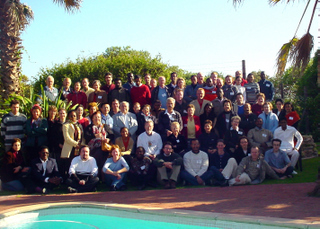Desiccation Workshops
Desiccation-tolerance is actually an extraordinary survival mechanism but, because most people are familiar with seeds in the context of crops, few consider just how remarkable a property it is! Perhaps even less widely appreciated are the desiccation-tolerant, so-called resurrection plants: these angiosperms can dry down to a withered mass of dead-looking plant detritus but will, when water becomes available, remarkably 'spring back'. The property of being able to withstand extreme desiccation as a vegetative plant, is not confined to angiosperms, as significant research on lower order plants - particularly on mosses - has shown. As far as seeds are concerned, it is suspected that a great many of the tropical and sub-tropical species may produce seeds that are not desiccation-tolerant in the strict sense. It is a sobering thought that most of our knowledge of seed biology was, until relatively recently, derived from in-depth studies on about 20 crop species. Considering that there are in excess of 250,000 species of angiosperms, there is a lot to learn about seeds!
These considerations then, are part of the philosophy underlying the 'Desiccation Workshops', as they have come to be known. All have been held in South Africa , the first in 1994 in the Kruger National Park , then in 1997 at Franschhoek in the Cape Province , in 2000 at the Itala Game reserve in KwaZulu-Natal , and in 2004 at Blouwater Baai on the Cape west coast . The idea of holding these periodic workshops was born at the 4th International Workshop on Seeds in Angers, France, in 1993, when (after a few beers) a small group with a focused research interest in desiccation-tolerance and -sensitivity, decided that this topic tended to get lost in the bigger arena of seed biology. Since then, the 'Desiccation Workshops' have attracted a group of about 60-70 people, all with a thirst for progress in this specialised area, and have recently become recognised meetings of the International Society for Seed Science (ISSS).

It was decided early on, that seed biologists whose interests lay in the realms of desiccation-sensitivity and -tolerance, and those scientists focusing on these aspects in vegetative plant tissues, had a lot in common and would, in fact, react synergistically. This proved to be a good judgement, and in the opinion of all the delegates, has provided that extra 'something', as each group has learned much from the other. Many micro-organisms and some animals are also desiccation tolerant and it is hoped that scientists investigating these organisms might become contributors to the forthcoming and future Desiccation Workshops.